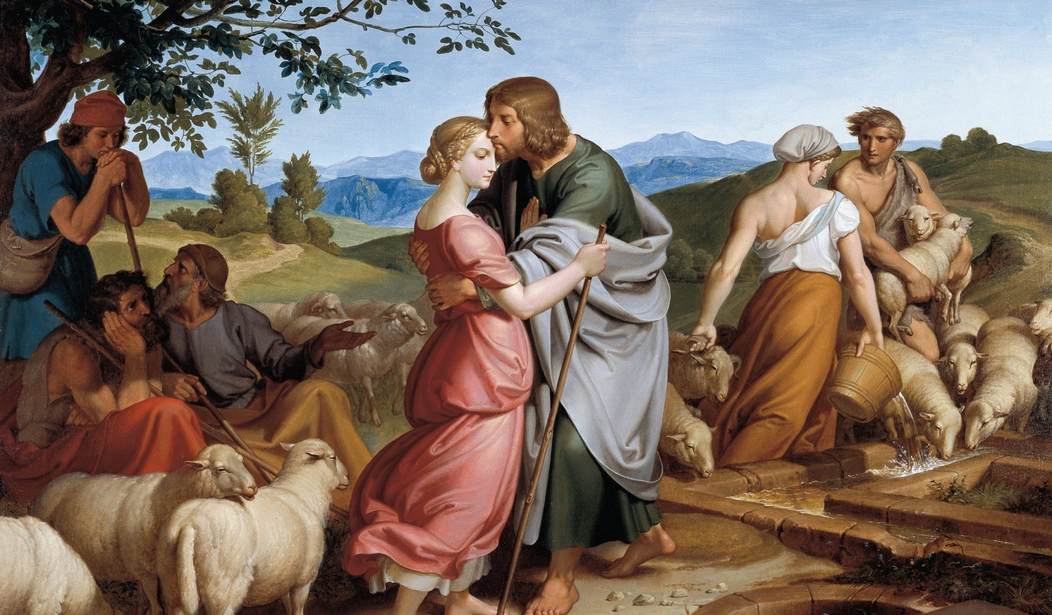Continuing a plan to get through the entire Bible in a year, follow as I journal through the reading. I have chosen a straightforward approach that begins in Genesis and ends in Revelation. This will not be an in-depth study or a comprehensive commentary. There are plenty of sources for such material. This is stage one Bible reading, taking the text at face value and sharing impressions.
Today’s reading comes from the book of Genesis, chapters 27 through 29, covering much deception in the life of Jacob. Through deception, Jacob gains his father’s blessing. Through fraud, Jacob acquires his first wife Leah. Some impressions from the text:
- The account in Genesis 27, where Rebekah and Jacob conspire to deprive Esau of Isaac’s blessing, presents more questions than answers. What mechanism was at work here? What did it mean to be “blessed” by Isaac? From what power was such blessing drawn? Why did Jabob’s deception seemingly bind Isaac and deprive Esau? Shouldn’t the fraud have negated the blessing? This is an example of an account which does not yield easily to cursory interpretation.
- Suffice it to say, whatever mechanism was at work in Isaac’s blessing, Jacob succeeding over his brother fulfilled God’s prophecy in Genesis 25 that “the older shall serve the younger.”
- Like his father Isaac before him, Jacob is cloistered from the local Canaanite women and sent to select a wife from among his mother’s kin. Again, the concern here appears to be religious. The Canaanites do not worship the Lord, and would corrupt what is meant to be God’s chosen bloodline for producing the Christ.
- Esau, despite having lost both his birthright and his father’s blessing, still seeks to please Isaac. He therefore takes a wife from among their kin in Ishmael’s house, rather than from the Canaanites
- The dream of Jacob’s ladder at Bethel reiterates the purpose of God’s covenant with Abraham. “… in you and your offspring shall all the families of the earth be blessed.” What God did through Israel was done for all mankind. This is a point that was often missed by the Israelites themselves, and certainly by the religious leaders among the Jews in Christ’s time. What made the Israelites special was not being Israelites. It was being the conduit of delivery for Christ, through which all people — Jew and gentile — would be blessed.
- The account of Bethel appears to introduce the concept of the tithe. “… all that you [God] give me I will give a full tenth to you.”
- The tale of how Jacob worked seven years for Laban in an effort to earn the hand of Rachel in marriage is baffling by modern standards. Laban agreed to give Rachel to Jacob in marriage after seven years of labor, but pulled a fast one on the marriage night, substituting the eldest Leah instead. That’s called fraud, and would negate any modern agreement. However, honor apparently compelled Jacob to maintain his union with Leah and work a second seven year stretch for Rachel.
- What was God doing with Leah and Rachel? It’s not readily apparent. He “saw that Leah was hated [by Jacob], he opened her womb, but Rachel was barren.” Why did God care either way? What was the point here?
Return soon as we continue our year-long journey through the text of the Bible.
Catch up on the previous entries:
In the Beginning: The Creation, His Rest, Our Fall – Genesis 1-3
An End of All Flesh: Abel’s Murder, Man’s Corruption, and the Great Flood – Genesis 4-7
Noah’s Flood Led to History’s First Post-Apocalyptic Society – Genesis 8-11
Abram Believed: The Pre-Gospel Gospel – Genesis 12-15
Abraham, the Father of Faith, Also Harbored Doubt – Genesis 16-18
Twin Cities of Sin: The Judgment of Sodom and Gomorrah – Genesis 19-21
Was Abraham a Psychotic Child Murderer? – Genesis 22-24
Isaac Follows in His Father’s Footsteps – Genesis 25 and 26









Join the conversation as a VIP Member